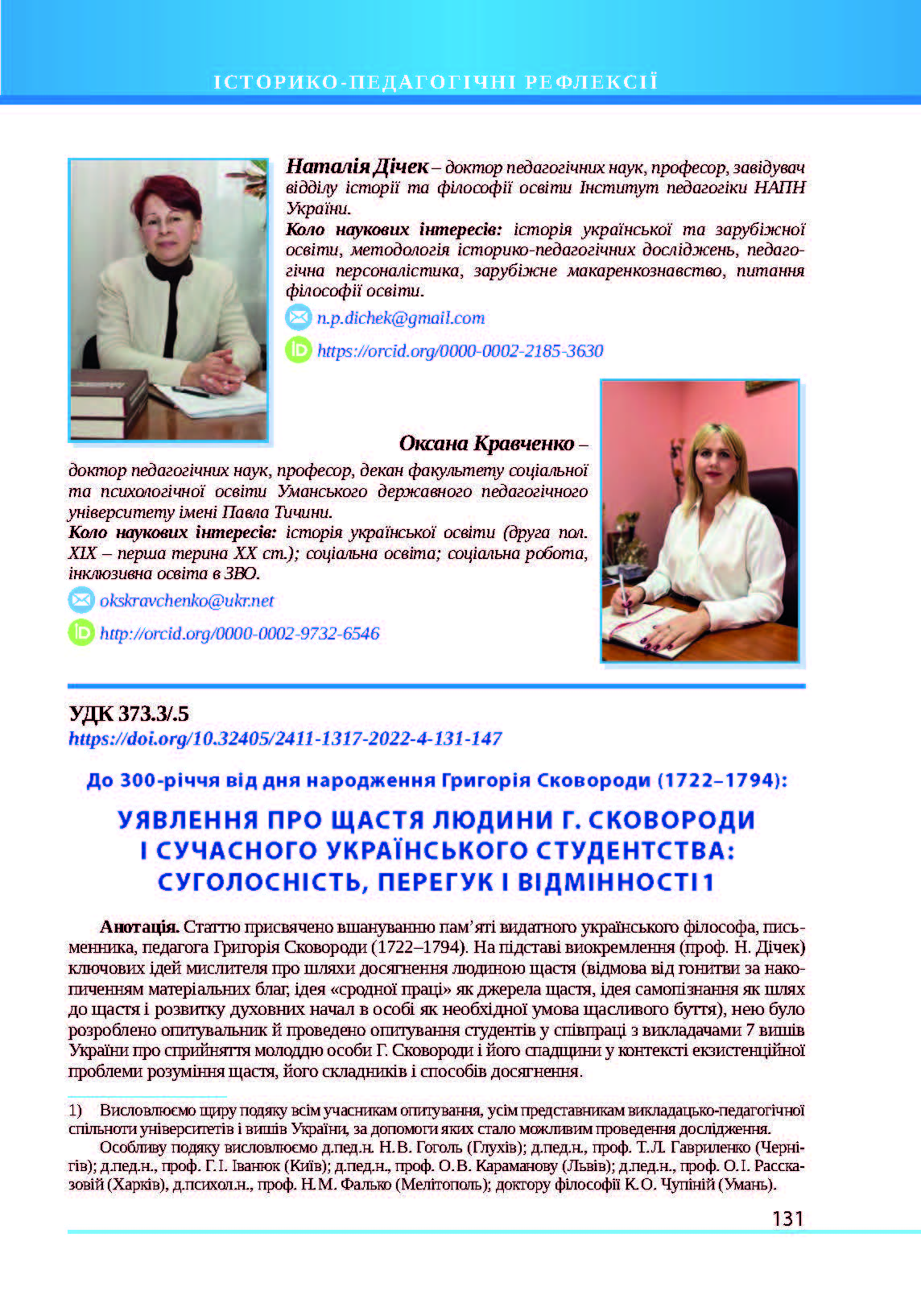Abstract
The article is dedicated to the memory of the outstanding Ukrainian philosopher, writer, teacher Hryhorii Skovoroda (1722-1794). Based on the identification of the philosopher's key ideas about the ways a person can achieve happiness (renunciation of the pursuit of the accumulation of material wealth, the idea of doing the job corresponding to natural abilities as a source of happiness, the idea of self-knowledge as a path to happiness and spiritual development), professor N. Dichek worked out a questionnaire and in collaboration with the educators from the 7 Ukrainian universities conducted a survey of students about their perception of the personality and heritage of H. Skovoroda in the context of the existential problem of understanding happiness, its components and ways to achieve it.
The peculiarity of the student survey was that it was carried out in two stages: before the war aggression against Ukraine (from 01/31/2022 till 02/23/2022), with 198 participants, and after the intensification and expansion of Russian aggression (from 06/17/2022 till 06/26/2022), 228 participants. The first important point: during both "cuts" the respondents were asked to answer the same questions, which ensured the comparability of the results. The second point: in the summer series of the survey, one more open question was added. It concerned the attitude of young people toward the understanding of “happiness” in the extreme living conditions of military operations.
The purpose of the article is divided into two parts: firstly, to describe and summarize the results of an interregional survey of contemporary Ukrainian student youth and, secondly, another - an attempt to identify the priority facts of students' consciousness about the personality and ideas of H. Skovoroda. At the same time, we planned to find out the thoughts of young people about happiness, the impact of a hybrid war on their understanding of “happiness”.
It has been established, firstly: more than 70% of the respondents considered H.Skovoroda an outstanding thinker and a figure of the national history, a personified phenomenon of national historical memory. Moreover, about 20% of the participants consider him a role model, which means that he is quite a real figure capable to inspire some of the contemporary youth in worldview searches. This conclusion is also confirmed by the frequent use of his aphorisms in the respondents' answers. Secondly, 97% of students indicated that the war affected their idea of happiness. Thirdly, the conceptual ethical thoughts of H. Skovoroda about human happiness are perceived by today's youth, in such a way: ideas about happiness in self-knowledge are shared by more than 50%; the opinion about happiness in performing the job corresponding to natural abilities is up to 28%, but only about 15-17% agree with the views on the low importance of material wealth, and another part hesitates and partially agrees (up to 20%).
References
Бекєшкіна, І. (2020). Види і типи соціологічних досліджень. Опитувaння гpомaдської думки. https://razumkov.org.ua/uploads/%D0%9F%D0%BE%D1%81%D1%96%D0%B1%D0%BD%D0%B8%D0%BA.pdf
Бекєшкіна, І. (2020). Як розуміти дані соціологічних опитувань. Типові помилки інтерпретації. Опитувaння гpомaдської думки https://razumkov.org.ua/uploads/%D0%9F%D0%BE%D1%81%D1%96%D0%B1%D0%BD%D0%B8%D0%BA.pdf
Всевітній звіт щастя 2021 р. https://www.radiosvoboda.org/a/ukraina-reytyng-shchastya-2021/31159705.html
Дічек, Н. (2022). Людина і смисл її життя у творчості Г. Сковороди. Український педагогічний журнал. (3), 116‒126. https://uej.undip.org.ua/index.php/journal/article/view/616
Злобіна, О. (2020). Питання в журналістському інтерв’ю та соціологічному Зміст опитування: спільні помилки – відмінні наслідки. Опитувaння гpомaдської думки https://razumkov.org.ua/uploads/%D0%9F%D0%BE%D1%81%D1%96%D0%B1%D0%BD%D0%B8%D0%BA.pdf
Особливості ідентичності громадян України: проблеми та перспективи консолідації суспільства (2016). http://razumkov.org.ua/upload/Identi-2016.pdf
Паніна, Н. В. (2007). Технологія соціологічного дослідження: курс лекцій, 2-ге видання, доповнене. Київ: НАН України, Інститут соціології. Вища школа соціології.
Паніотто, В. І., Харченко, Н. М. (2017). Методи опитування. Київ.
Піча, В. М. (1999). Соціологія: загальний курс. Навчальний посібник для студентів вищих закладів освіти України. Київ: Каравела.
Римаренко, Ю. (1996). Українська емоційність. Мала енциклопедія етнодержавознавства. Київ: Генеза, Довіра. 146‒147.
Сахно, Ю. (2021). Самооцінка щастя населенням України, грудень 2021р. https://www.google.com/search?q =chrome..69i57.5275j0j15&sourceid=chrome&ie=UTF-8
Сковорода, Г.С. (1973a). Благодарный Еродій. (близько 1787). Сковорода Г.С. Повне зібрання творів: У 2 томах (Т. 2, 99‒118). Наукова думка.
Сковорода, Г.С. (1973b). Брань архистратига Михаила со Сатаною о сем: лего біть благим. (1783). Сковорода Г.С. Повне зібрання творів: У 2 томах (Т. 2, 59‒84). Наукова думка.
Сковорода, Г.C. (1973с). Жизнь Григорія Сковороды. Сковорода Г.С. Повне зібрання творів: У 2 томах (Т. 2, 439‒476). Наукова думка.
Сковорода, Г.С. (1973d). Книжечка о чтеніи священнаго писанія нареченная Жена Лотова. (1780). Сковорода Г.С. Повне зібрання творів: У 2 томах (Т. 2, 358‒411). Наукова думка.
Сковорода, Г.С. (1973e). Кольцо. Дружеский разговор о душевном мире (1773‒1774). Сковорода Г.С. Повне зібрання творів: У 2 томах. (Т. 1, 358‒411). Наукова думка.
Сковорода, Г.С. (1973f). Наркісс. Разглагол о том: узнай себе (1769‒1771). Сковорода Г.С. Повне зібрання творів: У 2 томах (Т. 1, 154‒200). Наукова думка.
Сковорода, Г.С. (1973j). Разговор пяти путников о истинном щастіи в жизни [Разговор дружескій о душевном мире] (1770-і). Сковорода Г.С. Повне зібрання творів: У 2 томах (Т. 1., 324‒356). Наукова думка.
Сковорода, Г.С. (1973k). Разговор, называемый алфавит, или букварь мира (1774). Сковорода Г.С. Повне зібрання творів: У 2 томах (Т. 1, 411‒450.). Наукова думка.
Сковорода, Г.С. (1973l). Симфоніа, нареченная Книга Асхань о познаніи самого себе (після 1771 р.). Сковорода Г.С. Повне зібрання творів: У 2 томах (Т. 1, 201‒262). Наукова думка.
Слюсаревський М.М., Гуменюк О.І., Дворник М.С., Черниш Л.П. (2019). Соціальна ситуація в Україні: особливості відображення трансформаційних процесів у громадській думці (2014‒2018): довідник. Київ, Талком.
Соціологічні дослідження в молодіжній роботі (2021). Навчально-методичний посібник для фахівців, які працюють з молоддю. Київ: ДУ «Державний інститут сімейної та молодіжної політики».
Bryman, Alan, & Bell, Edward. (2018). Social Research Methods. Oxford University Press.
Thompson, Karl (2016). Research Methods in Sociology – An Introduction – ReviseSociology. https://revisesociology.com/2016/01/03/research-methods-sociology.

This work is licensed under a Creative Commons Attribution-NonCommercial-ShareAlike 4.0 International License.


